标签:机制 分解 ips 命令行 OWIN http inpu under 恢复
一.理论知识部分
异常、日志、断言和调试
1.异常:在程序的执行过程中所发生的异常事件,它中断指令的正常执行。
2.Java的异常处理机制可以控制程序从错误产生的位置转移到能够进行错误处理的位置。
3.程序中出现的常见的错误和问题有:用户输入错误、设备错误、物理限制、代码错误。
4.Java把程序运行时可能遇到的错误分为两类:
(1)非致命异常:通过某种修正后程序还能继续执行。这类错误叫作异常。如:文件不存在、无效的数组下标、空引用、网络断开、打印机脱机、磁盘满等。 Java中提供了一种独特的处理异常的机制,通过异常来处理程序设计中出现的错误。
(2)致命异常:程序遇到了非常严重的不正常状态,不能简单恢复执行,是致命性错误。如:内存耗尽、系统内部错误等。这种错误程序本身无法解决。
5.Java中所有的异常类都直接或间接地继承于Throwable类。除内置异常类外程序员可自定义异常类。
6.Java中的异常类可分为两大类:
(1)Error Error类层次结构描述了Java 运行时系统的内部错误和资源耗尽错误。应用程序不应该捕获这类异常,也不会抛出这种异常。
(2)Exception Exception类:重点掌握的异常类。Exception层次结构又分解为两个分支:一个分支派生于RuntimeException;另一个分支包含其他异常。RuntimeException为运行时异常类,一般是程序错误产生。
7.派生于RuntimeException的异常包含下面几种情况:错误的类型转换、数组访问越界、访问空指针等等。
8.Java将派生于Error类或RuntimeException类的所有异常称为未检查异常,编译器允许不对它们做出异常处理。
9.非运行时异常,程序本身没有问题,但由于某种情况的变化,程序不能正常运行,导致异常出现。
10.除了运行时异常之外的其它继承自Exception类的异常类包括: 试图在文件尾部后面读取数据、试图打开一个错误格式的URL等等。
11.编译器要求程序必须对这类异常进行处理(checked),称为已检查异常。
12.Exception的其它子类:EmptyStackException、NoSuchFieldException、NoSuchMethodException、ClassNotFoundException、CloneNotSupportedException、IllegalAccessException、InstantiationException、InterruptedException。
13.声明抛出异常:如果一个方法可能会生成一些异常,但是该方法并不确切知道如何对这些异常事件进行处理,此时,这个方法就需声明抛出这些异常。
“一个方法不仅需要告诉编译器将要返回什么值,还要告诉编译器可能发生什么异常”。
14.声明抛出异常在方法声明中用throws子句中来指明。 15.throws子句可以同时指明多个异常,说明该方法将不对这些异常进行处理,而是声明抛出它们。
16.以下4种情况需要方法用throws子句声明抛出异常:
方法调用了一个抛出已检查异常的方法。 程序运行过程中可能会发生错误,并且利用throw语句抛出一个已检查异常对象。 程序出现错误。例如,a[-1] = 0;Java虚拟机和运行时库出现的内部异常。
17.一个方法必须声明该方法所有可能抛出的已检查异常,而未检查异常要么不可控制(Error),要么应该避免发生(RuntimeException)。如果方法没有声明所有可能发生的已检查异常,编译器会给出一个错误消息。
18.当Java应用程序出现错误时,会根据错误类型产生一个异常对象,这个对象包含了异常的类型和错误出现时程序所处的状态信息。把异常对象递交给Java编译器的过程称为出。
19.抛出异常要生成异常对象,异常对象可由某些类的实例生成,也可以由JVM生成。抛出异常对象通过throw语句来实现。
20.对于已存在的异常类,抛出该类的异常对象非常容易,步骤是:找到一个合适的异常类;创建这个类的一个对象;将该对象抛出。自定义异常类:定义一个派生于Exception的直接或间接子类。如一个派生于IOException的类。 23.自定义的异常类应该包括两个构造器:默认构造器;带有详细描述信息的构造器(超类Throwable的toString方法会打印出这些详细信息,有利于代码调试 程序运行期间,异常发生时,Java运行系统从异常生成的代码块开始,寻找相应的异常处理代码,并将异常交给该方法处理,这一过程叫作捕获。 某个异常发生时,若程序没有在任何地方进行该异常的捕获,则程序就会终止执行,并在控制台上输出异常信息。异常的代码范围,由try所限定的代码块中的语句在执行过程中可能会自动生成异常对象并抛出。
二.实验部分
1、实验目的与要求
(1) 掌握java异常处理技术;
(2) 了解断言的用法;
(3) 了解日志的用途;
(4) 掌握程序基础调试技巧;
2、实验内容和步骤
实验1:用命令行与IDE两种环境下编辑调试运行源程序ExceptionDemo1、ExceptionDemo2,结合程序运行结果理解程序,掌握未检查异常和已检查异常的区别。
|
//异常示例1 public class ExceptionDemo1 { public static void main(String args[]) { int a = 0; System.out.println(5 / a); } } |
|
//异常示例2 import java.io.*;
public class ExceptionDemo2 { public static void main(String args[]) { FileInputStream fis=new FileInputStream("text.txt");//JVM自动生成异常对象 int b; while((b=fis.read())!=-1) { System.out.print(b); } fis.close(); } } |
异常的解决:
public class ExceptionDemo1 {
public static void main(String[] args) {
int a = 0;
if(a==0) {
System.out.println("除数为零");
}
else
{
System.out.println(5 / a);
}
}
}


import java.io.*;
public class ExceptionDemo2{
public static void main(String args[])
{
FileInputStream fis;
try {
fis = new FileInputStream("text.txt");
int b;
while((b=fis.read())!=-1)
{
System.out.print(b);
}
fis.close();
}catch (Exception e) {
// TODO Auto-generated catch block
e.printStackTrace();//打印堆栈信息
// System.out.println("Hello.");
}//JVM自动生成异常对象
}
}

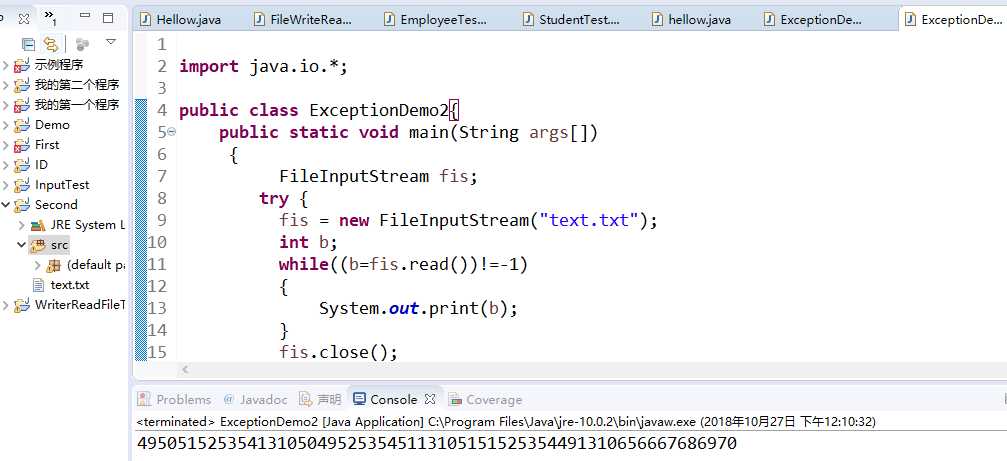
import java.io.*;
public class ExceptionDemo2 {
public static void main(String args[]) throws IOException
{
FileInputStream fis=new FileInputStream("text.txt");//JVM自动生成异常对象
int b;
while((b=fis.read())!=-1)
{
System.out.print(b);
}
fis.close();
}
}
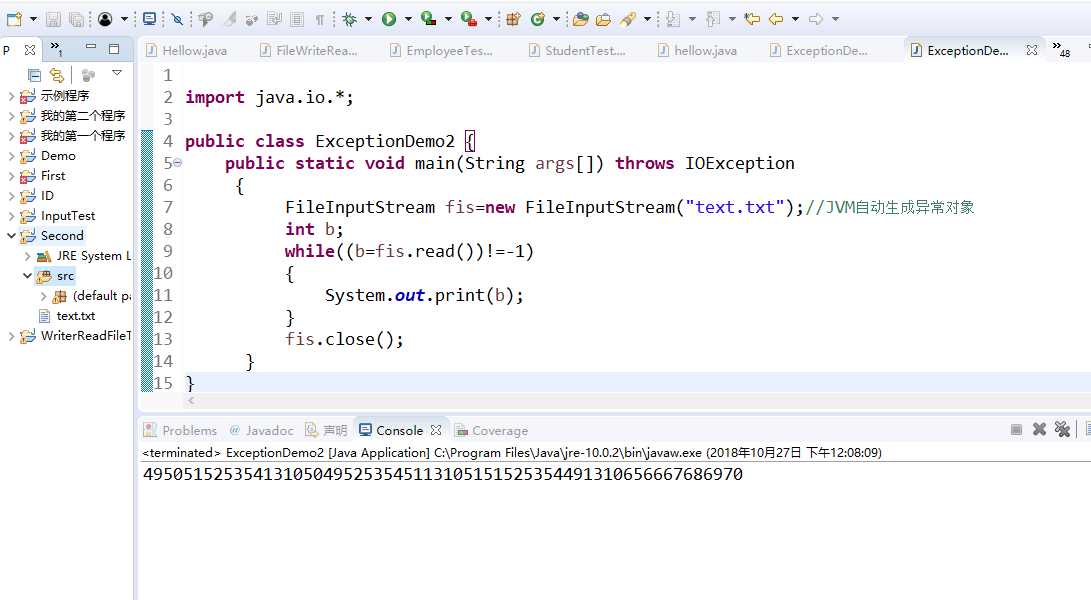
未检查异常:编译器允许不对其做出异常处理。已检查异常:编译器要求程序必须对这类异常进行处理。
实验2: 导入以下示例程序,测试程序并进行代码注释。
测试程序1:
l 在elipse IDE中编辑、编译、调试运行教材281页7-1,结合程序运行结果理解程序;
l 在程序中相关代码处添加新知识的注释;
l 掌握Throwable类的堆栈跟踪方法;
package stackTrace;
import java.util.*;
/**
* A program that displays a trace feature of a recursive method call.
* @version 1.01 2004-05-10
* @author Cay Horstmann
*/
public class StackTraceTest
{
/**
* Computes the factorial of a number
* @param n a non-negative integer
* @return n! = 1 * 2 * . . . * n
*/
public static int factorial(int n)
{
System.out.println("factorial(" + n + "):");
Throwable t = new Throwable();//抛出异常
StackTraceElement[] frames = t.getStackTrace();//获得构造这个对象时调用堆栈的跟踪
for (StackTraceElement f : frames)
System.out.println(f);
int r;
if (n <= 1) r = 1;
else r = n * factorial(n - 1);
System.out.println("return " + r);
return r;
}
public static void main(String[] args)
{
Scanner in = new Scanner(System.in);
System.out.print("Enter n: ");
int n = in.nextInt();
factorial(n);
}
}
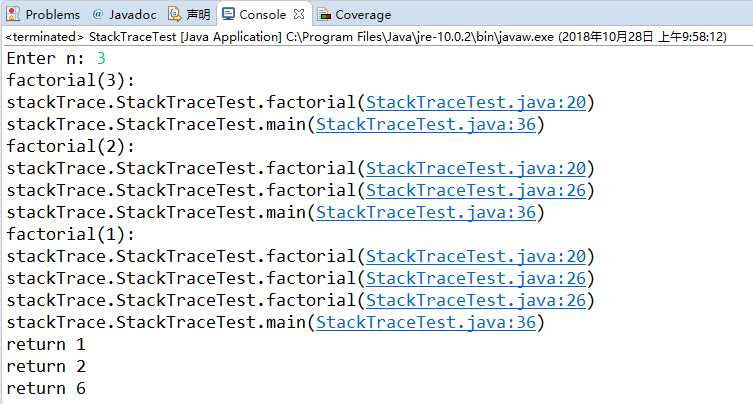
堆栈跟踪是程序执行中一个方法调用过程的列表。它包含了程序执行过程中方法调用的特定位置。
测试程序2:
l Java语言的异常处理有积极处理方法和消极处理两种方式;
l 下列两个简答程序范例给出了两种异常处理的代码格式。在elipse IDE中编辑、调试运行源程序ExceptionalTest.java,将程序中的text文件更换为身份证号.txt,要求将文件内容读入内容,并在控制台显示;
l 掌握两种异常处理技术的特点。
|
//积极处理方式 import java.io.*;
class ExceptionTest { public static void main (string args[]) { try{ FileInputStream fis=new FileInputStream("text.txt"); } catch(FileNotFoundExcption e) { …… } …… } } |
|
//消极处理方式
import java.io.*; class ExceptionTest { public static void main (string args[]) throws FileNotFoundExcption { FileInputStream fis=new FileInputStream("text.txt"); } } |
积极:
import java.io.BufferedReader;
import java.io.FileInputStream;
import java.io.FileNotFoundException;
import java.io.IOException;
import java.io.InputStreamReader;
public class ExceptionalTest {
public static void main(String args[]) {
try {
FileInputStream fis = new FileInputStream("身份证号.txt");
BufferedReader in = new BufferedReader(new InputStreamReader(fis));
String a,b = new String();
while ((a = in.readLine()) != null) {
b += a + "\n ";
}
in.close();
System.out.println(b);
} catch (FileNotFoundException e) {
System.out.println("学生信息文件找不到");
e.printStackTrace();
} catch (IOException e) {
System.out.println("学生信息文件读取错误");
e.printStackTrace();
}
}
}
import java.io.BufferedReader;
import java.io.FileInputStream;
import java.io.FileNotFoundException;
import java.io.IOException;
import java.io.InputStreamReader;
public class ExceptionalTest {
public static void main(String[] args) throws IOException {
FileInputStream fis = new FileInputStream("身份证号.txt");
BufferedReader in = new BufferedReader(new InputStreamReader(fis));
String a, b = new String();
while ((a = in.readLine()) != null) {
b += a+ "\n ";
}
in.close();
System.out.println(b);
}
}
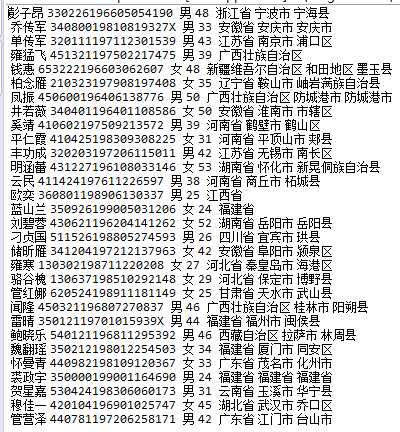
实验3: 编程练习
练习1:
l 编制一个程序,将身份证号.txt 中的信息读入到内存中;
l 按姓名字典序输出人员信息;
l 查询最大年龄的人员信息;
l 查询最小年龄人员信息;
l 输入你的年龄,查询身份证号.txt中年龄与你最近人的姓名、身份证号、年龄、性别和出生地;
l 查询人员中是否有你的同乡;
l 在以上程序适当位置加入异常捕获代码。
import java.io.BufferedReader;
import java.io.File;
import java.io.FileInputStream;
import java.io.FileNotFoundException;
import java.io.IOException;
import java.io.InputStreamReader;
import java.util.ArrayList;
import java.util.Arrays;
import java.util.Scanner;
import java.util.Collections;//对集合进行排序、查找、修改等;
public class Test {
private static ArrayList<Citizen> citizenlist;
public static void main(String[] args) {
citizenlist = new ArrayList<>();
Scanner scanner = new Scanner(System.in);
File file = new File("E:/java/身份证号.txt");
//异常捕获
try {
FileInputStream fis = new FileInputStream(file);
BufferedReader in = new BufferedReader(new InputStreamReader(fis));
String temp = null;
while ((temp = in.readLine()) != null) {
Scanner linescanner = new Scanner(temp);
linescanner.useDelimiter(" ");
String name = linescanner.next();
String id = linescanner.next();
String sex = linescanner.next();
String age = linescanner.next();
String birthplace = linescanner.nextLine();
Citizen citizen = new Citizen();
citizen.setName(name);
citizen.setId(id);
citizen.setSex(sex);
// 将字符串转换成10进制数
int ag = Integer.parseInt(age);
citizen.setage(ag);
citizen.setBirthplace(birthplace);
citizenlist.add(citizen);
}
} catch (FileNotFoundException e) {
System.out.println("信息文件找不到");
e.printStackTrace();
} catch (IOException e) {
System.out.println("信息文件读取错误");
e.printStackTrace();
}
boolean isTrue = true;
while (isTrue) {
System.out.println("1.按姓名字典序输出人员信息");
System.out.println("2.查询最大年龄的人员信息、查询最小年龄人员信息");
System.out.println("3.查询人员中是否查询人员中是否有你的同乡");
System.out.println("4.输入你的年龄,查询文件中年龄与你最近人的姓名、身份证号、年龄、性别和出生地");
System.out.println("5.退出");
int nextInt = scanner.nextInt();
switch (nextInt) {
case 1:
Collections.sort(citizenlist);
System.out.println(citizenlist.toString());
break;
case 2:
int max = 0, min = 100;
int m, k1 = 0, k2 = 0;
for (int i = 1; i < citizenlist.size(); i++) {
m = citizenlist.get(i).getage();
if (m > max) {
max = m;
k1 = i;
}
if (m < min) {
min = m;
k2 = i;
}
}
System.out.println("年龄最大:" + citizenlist.get(k1));
System.out.println("年龄最小:" + citizenlist.get(k2));
break;
case 3:
System.out.println("出生地:");
String find = scanner.next();
String place = find.substring(0, 3);
for (int i = 0; i < citizenlist.size(); i++) {
if (citizenlist.get(i).getBirthplace().substring(1, 4).equals(place))
System.out.println("出生地" + citizenlist.get(i));
}
break;
case 4:
System.out.println("年龄:");
int yourage = scanner.nextInt();
int near = peer(yourage);
int j = yourage - citizenlist.get(near).getage();
System.out.println("" + citizenlist.get(near));
break;
case 5:
isTrue = false;
System.out.println("程序已退出!");
break;
default:
System.out.println("输入有误");
}
}
}
public static int peer(int age) {
int flag = 0;
int min = 53, j = 0;
for (int i = 0; i < citizenlist.size(); i++) {
j = citizenlist.get(i).getage() - age;
if (j < 0)
j = -j;
if (j < min) {
min = j;
flag = i;
}
}
return flag;
}
}
public class Citizen implements Comparable<Citizen> {
private String name;
private String id;
private String sex;
private int age;
private String birthplace;
public String getName() {
return name;
}
public void setName(String name) {
this.name = name;
}
public String getId() {
return id;
}
public void setId(String id) {
this.id = id;
}
public String getSex() {
return sex;
}
public void setSex(String sex) {
this.sex = sex;
}
public int getage() {
return age;
}
public void setage(int age) {
this.age = age;
}
public String getBirthplace() {
return birthplace;
}
public void setBirthplace(String birthplace) {
this.birthplace = birthplace;
}
public int compareTo(Citizen other) {
return this.name.compareTo(other.getName());
}
public String toString() {
return name + "\t" + sex + "\t" + age + "\t" + id + "\t" + birthplace + "\n";
}
}
结果:
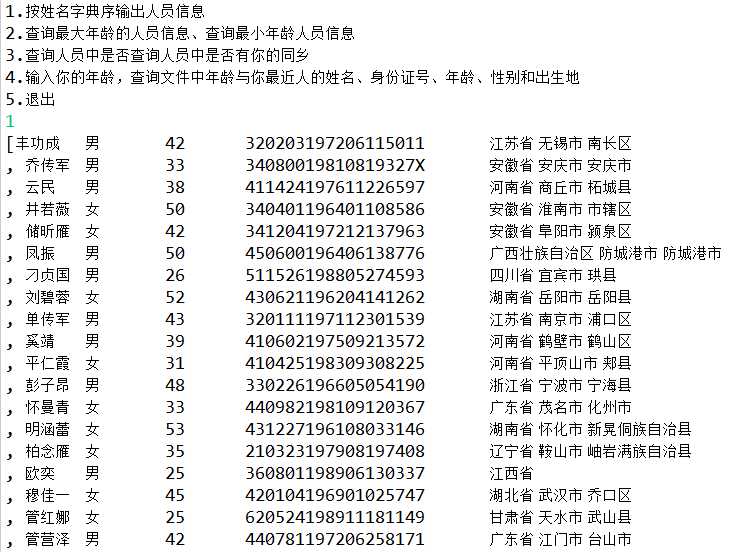
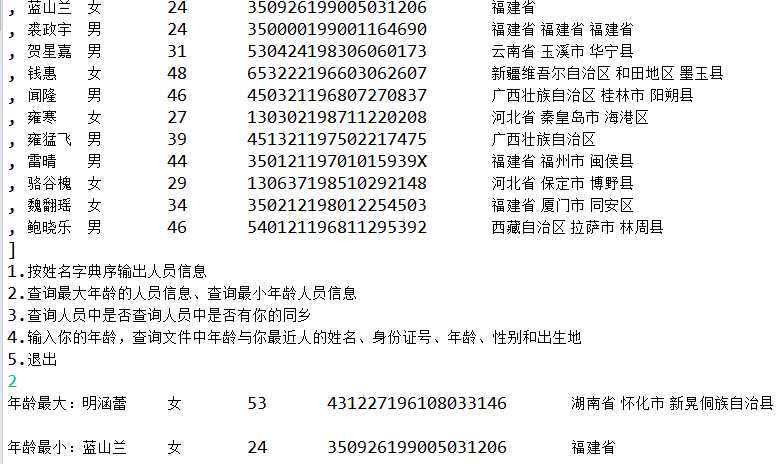
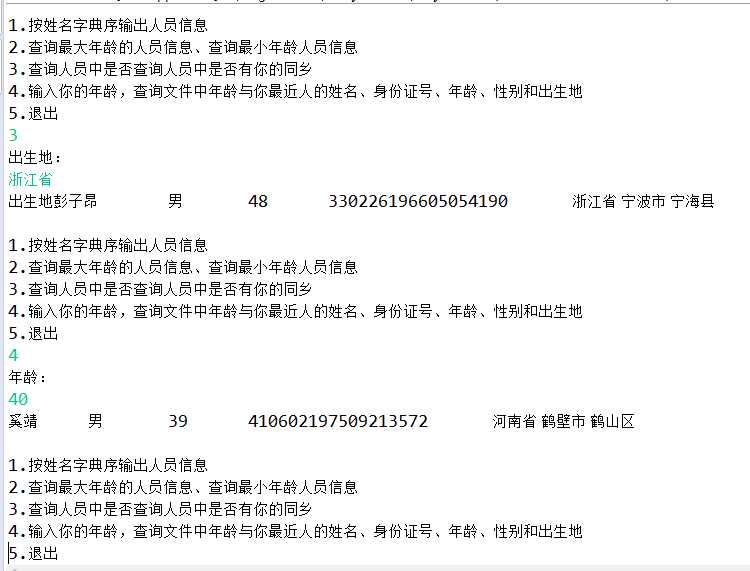
练习2:
l 编写一个计算器类,可以完成加、减、乘、除的操作;
l 利用计算机类,设计一个小学生100以内数的四则运算练习程序,由计算机随机产生10道加减乘除练习题,学生输入答案,由程序检查答案是否正确,每道题正确计10分,错误不计分,10道题测试结束后给出测试总分;
l 将程序中测试练习题及学生答题结果输出到文件,文件名为test.txt;
l 在以上程序适当位置加入异常捕获代码。
import java.io.FileNotFoundException;
import java.io.IOException;
import java.io.PrintWriter;
import java.util.Scanner;
public class calculator {
public static void main(String[] args) {
Scanner in = new Scanner(System.in);
PrintWriter out = null;
try {
out = new PrintWriter("test.txt");
int sum = 0;
for (int i = 0; i < 10; i++) {
int a = (int) Math.round(Math.random() * 10);
int b = (int) Math.round(Math.random() * 10);
int menu = (int) Math.round(Math.random() * 3);
switch (menu) {
case 1:
System.out.println(a + "+" + b + "=");
int c1 = in.nextInt();
if (c1 == (a + b)) {
sum += 10;
System.out.println("恭喜答案正确");
} else {
System.out.println("抱歉,答案错误");
}
break;
case 2:
System.out.println(a + "-" + b + "=");
int c2 = in.nextInt();
if (c2 == (a - b)) {
sum += 10;
System.out.println("恭喜答案正确");
} else {
System.out.println("抱歉,答案错误");
}
break;
case 3:
System.out.println(a + "*" + b + "=");
int c = in.nextInt();
if (c == a * b) {
sum += 10;
System.out.println("恭喜答案正确");
} else {
System.out.println("抱歉,答案错误");
}
break;
case 4:
if (b == 0) {
System.out.println("除数为零");
} else {
System.out.println(a + "/" + b + "=");
}
int c4 = in.nextInt();
if (c4 == a / b) {
sum += 10;
System.out.println("恭喜答案正确");
} else {
System.out.println("抱歉,答案错误");
}
break;
}
}
System.out.println("你的得分为" + sum);
out.println("你的得分为" + sum);
out.close();
} catch (FileNotFoundException e) {
e.printStackTrace();
}
}
}
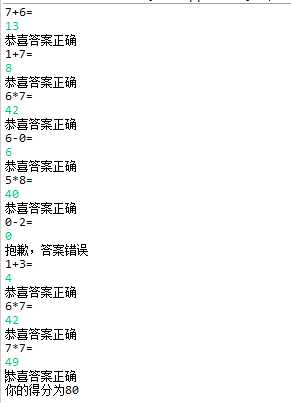
实验4:断言、日志、程序调试技巧验证实验。
实验程序1:
|
//断言程序示例 public class AssertDemo { public static void main(String[] args) { test1(-5); test2(-3); }
private static void test1(int a){ assert a > 0; System.out.println(a); } private static void test2(int a){ assert a > 0 : "something goes wrong here, a cannot be less than 0"; System.out.println(a); } } |
l 在elipse下调试程序AssertDemo,结合程序运行结果理解程序;
l 注释语句test1(-5);后重新运行程序,结合程序运行结果理解程序;
l 掌握断言的使用特点及用法。
public class AssertDemo {
public static void main(String[] args) {
test1(-5);
test2(-3);
}
private static void test1(int a) {
assert a > 0;
System.out.println(a);
}
private static void test2(int a) {
assert a > 0 : "something goes wrong here, a cannot be less than 0";
System.out.println(a);
}
}

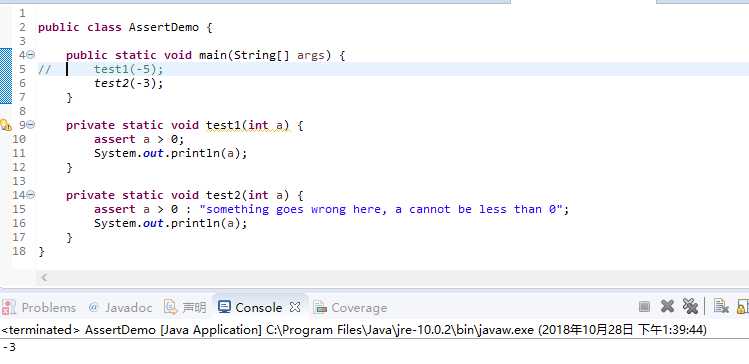
实验程序2:
l 用JDK命令调试运行教材298页-300页程序7-2,结合程序运行结果理解程序;
l 并掌握Java日志系统的用途及用法。
package logging;
import java.awt.*;
import java.awt.event.*;
import java.io.*;
import java.util.logging.*;
import javax.swing.*;
/**
* A modification of the image viewer program that logs various events.
* @version 1.03 2015-08-20
* @author Cay Horstmann
*/
public class LoggingImageViewer
{
public static void main(String[] args)
{
if (System.getProperty("java.util.logging.config.class") == null
&& System.getProperty("java.util.logging.config.file") == null)
{
try
{
Logger.getLogger("com.horstmann.corejava").setLevel(Level.ALL);
final int LOG_ROTATION_COUNT = 10;
Handler handler = new FileHandler("%h/LoggingImageViewer.log", 0, LOG_ROTATION_COUNT);
Logger.getLogger("com.horstmann.corejava").addHandler(handler);
}
catch (IOException e)
{
Logger.getLogger("com.horstmann.corejava").log(Level.SEVERE,
"Can‘t create log file handler", e);
}
}
EventQueue.invokeLater(() ->
{
Handler windowHandler = new WindowHandler();
windowHandler.setLevel(Level.ALL);
Logger.getLogger("com.horstmann.corejava").addHandler(windowHandler);
JFrame frame = new ImageViewerFrame();
frame.setTitle("LoggingImageViewer");
frame.setDefaultCloseOperation(JFrame.EXIT_ON_CLOSE);
Logger.getLogger("com.horstmann.corejava").fine("Showing frame");
frame.setVisible(true);
});
}
}
/**
* The frame that shows the image.
*/
class ImageViewerFrame extends JFrame
{
private static final int DEFAULT_WIDTH = 300;
private static final int DEFAULT_HEIGHT = 400;
private JLabel label;
private static Logger logger = Logger.getLogger("com.horstmann.corejava");
public ImageViewerFrame()
{
logger.entering("ImageViewerFrame", "<init>");
setSize(DEFAULT_WIDTH, DEFAULT_HEIGHT);
// set up menu bar
JMenuBar menuBar = new JMenuBar();
setJMenuBar(menuBar);
JMenu menu = new JMenu("File");
menuBar.add(menu);
JMenuItem openItem = new JMenuItem("Open");
menu.add(openItem);
openItem.addActionListener(new FileOpenListener());
JMenuItem exitItem = new JMenuItem("Exit");
menu.add(exitItem);
exitItem.addActionListener(new ActionListener()
{
public void actionPerformed(ActionEvent event)
{
logger.fine("Exiting.");
System.exit(0);
}
});
// use a label to display the images
label = new JLabel();
add(label);
logger.exiting("ImageViewerFrame", "<init>");
}
private class FileOpenListener implements ActionListener
{
public void actionPerformed(ActionEvent event)
{
logger.entering("ImageViewerFrame.FileOpenListener", "actionPerformed", event);
// set up file chooser
JFileChooser chooser = new JFileChooser();
chooser.setCurrentDirectory(new File("."));
// accept all files ending with .gif
chooser.setFileFilter(new javax.swing.filechooser.FileFilter()
{
public boolean accept(File f)
{
return f.getName().toLowerCase().endsWith(".gif") || f.isDirectory();
}
public String getDescription()
{
return "GIF Images";
}
});
// show file chooser dialog
int r = chooser.showOpenDialog(ImageViewerFrame.this);
// if image file accepted, set it as icon of the label
if (r == JFileChooser.APPROVE_OPTION)
{
String name = chooser.getSelectedFile().getPath();
logger.log(Level.FINE, "Reading file {0}", name);
label.setIcon(new ImageIcon(name));
}
else logger.fine("File open dialog canceled.");
logger.exiting("ImageViewerFrame.FileOpenListener", "actionPerformed");
}
}
}
/**
* A handler for displaying log records in a window.
*/
class WindowHandler extends StreamHandler
{
private JFrame frame;
public WindowHandler()
{
frame = new JFrame();
final JTextArea output = new JTextArea();
output.setEditable(false);
frame.setSize(200, 200);
frame.add(new JScrollPane(output));
frame.setFocusableWindowState(false);
frame.setVisible(true);
setOutputStream(new OutputStream()
{
public void write(int b)
{
} // not called
public void write(byte[] b, int off, int len)
{
output.append(new String(b, off, len));
}
});
}
public void publish(LogRecord record)
{
if (!frame.isVisible()) return;
super.publish(record);
flush();
}
}
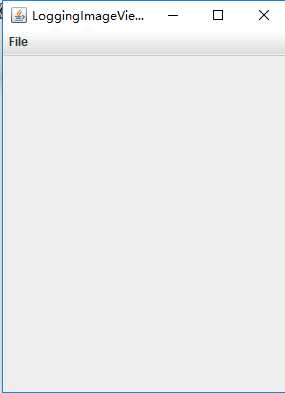
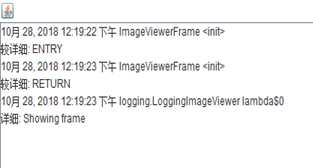
3.实验总结
通过本次实验,我对编程中出现的一些基本错误有了了解,也学习到了他们的处理方法,对程序中出现的异常的种类以及出现错误时如何抛出错误,捕获错误也有了初步的掌握。并且了解到一些异常的专用词,也明白了什么是致命异常和非致命异常。通过编程实践,我也掌握了处理异常的方法,并且基本能够在程序中恰当的位置添加try、catch语句。
马凯军201771010116《面向对象与程序设计Java》第九周学习总结
标签:机制 分解 ips 命令行 OWIN http inpu under 恢复
原文地址:https://www.cnblogs.com/zero--/p/9865559.html